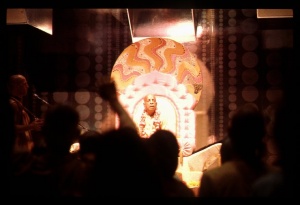SB 10.33.16: Difference between revisions
m (1 revision(s)) |
No edit summary |
||
| Line 1: | Line 1: | ||
{{info | {{info | ||
|speaker= | |speaker=Śukadeva Gosvāmī | ||
|listener=King | |listener=King Parīkṣit | ||
}} | }} | ||
[[Category:Srimad-Bhagavatam - Canto 10 Chapter 33]] | |||
[[Category:Bhagavatam Verses Spoken by Sukadeva Gosvami - Vanisource|103316]] | |||
<div style="float:left">'''[[Srimad-Bhagavatam]] - [[SB 10|Tenth Canto]] - [[SB 10.33: The Rasa Dance|Chapter 33: The Rāsa Dance]]'''</div> | |||
<div style="float:right">[[File:Go-previous.png|link=SB 10.33.15]] '''[[SB 10.33.15]] - [[SB 10.33.17]]''' [[File:Go-next.png|link=SB 10.33.17]]</div> | |||
{{RandomImage}} | |||
{{SBnotice}} | |||
==== TEXT 16 ==== | ==== TEXT 16 ==== | ||
<div | <div class="verse"> | ||
evaṁ pariṣvaṅga-karābhimarśa- | :evaṁ pariṣvaṅga-karābhimarśa- | ||
snigdhekṣaṇoddāma-vilāsa-hāsaiḥ | :snigdhekṣaṇoddāma-vilāsa-hāsaiḥ | ||
reme rameśo vraja-sundarībhir | :reme rameśo vraja-sundarībhir | ||
yathārbhakaḥ sva-pratibimba-vibhramaḥ | :yathārbhakaḥ sva-pratibimba-vibhramaḥ | ||
</div> | </div> | ||
| Line 17: | Line 22: | ||
==== SYNONYMS ==== | ==== SYNONYMS ==== | ||
<div | <div class="synonyms"> | ||
''evam''—thus; ''pariṣvaṅga''—with embracing; ''kara''—by His hand; ''abhimarśa''—with touching; ''snigdha''—affectionate; ''īkṣaṇa''—with glances; ''uddāma''—broad; ''vilāsa''—playful; ''hāsaiḥ''—with smiles; ''reme''—He took pleasure; ''ramā''—of the goddess of fortune; ''īśaḥ''—the master; ''vraja-sundarībhiḥ''—with the young women of the cowherd community; ''yathā''—just as; ''arbhakaḥ''—a boy; ''sva''—His own; ''pratibimba''—with the reflection; ''vibhramaḥ''—whose playing. | |||
</div> | </div> | ||
{{SBcollapse}} | |||
==== TRANSLATION ==== | ==== TRANSLATION ==== | ||
<div | <div class="translation"> | ||
In this way Lord Kṛṣṇa, the original Lord Nārāyaṇa, master of the goddess of fortune, took pleasure in the company of the young women of Vraja by embracing them, caressing them and glancing lovingly at them as He smiled His broad, playful smiles. It was just as if a child were playing with his own reflection. | In this way Lord Kṛṣṇa, the original Lord Nārāyaṇa, master of the goddess of fortune, took pleasure in the company of the young women of Vraja by embracing them, caressing them and glancing lovingly at them as He smiled His broad, playful smiles. It was just as if a child were playing with his own reflection. | ||
</div> | </div> | ||
| Line 31: | Line 36: | ||
==== PURPORT ==== | ==== PURPORT ==== | ||
<div | <div class="purport"> | ||
Śrīla Bhaktisiddhānta Sarasvatī Ṭhākura comments as follows on this verse: "Lord Kṛṣṇa alone is the Supreme Absolute Truth, and His potencies are unlimited. All these potencies, taking personal forms, engage Lord Kṛṣṇa in His pastimes. Just as the opulent manifestation of His one supreme transcendental potency manifests all the countless potencies of the Lord, so in the rāsa dance Kṛṣṇa manifests Himself as many times as there are various potencies represented by the gopīs. Everything is Kṛṣṇa, but by His desire His spiritual energy Yogamāyā manifests the gopīs. When His internal potency Yogamāyā thus produces such pastimes for the enhancement of His transcendental emotions, it is just like a young boy playing with His own reflection. But since these pastimes are created by His spiritual potency, they are eternal and self-manifesting." | Śrīla Bhaktisiddhānta Sarasvatī Ṭhākura comments as follows on this verse: "Lord Kṛṣṇa alone is the Supreme Absolute Truth, and His potencies are unlimited. All these potencies, taking personal forms, engage Lord Kṛṣṇa in His pastimes. Just as the opulent manifestation of His one supreme transcendental potency manifests all the countless potencies of the Lord, so in the ''rāsa'' dance Kṛṣṇa manifests Himself as many times as there are various potencies represented by the ''gopīs''. Everything is Kṛṣṇa, but by His desire His spiritual energy Yogamāyā manifests the ''gopīs''. When His internal potency Yogamāyā thus produces such pastimes for the enhancement of His transcendental emotions, it is just like a young boy playing with His own reflection. But since these pastimes are created by His spiritual potency, they are eternal and self-manifesting." | ||
</div> | </div> | ||
__NOTOC__ | </div> | ||
</div> | |||
<div style="float:right">[[File:Go-previous.png|link=SB 10.33.15]] '''[[SB 10.33.15]] - [[SB 10.33.17]]''' [[File:Go-next.png|link=SB 10.33.17]]</div> | |||
__NOTOC__ | |||
__NOEDITSECTION__ | |||
Revision as of 02:52, 23 May 2021

A.C. Bhaktivedanta Swami Prabhupada
Please note: The synonyms, translation and purport of this verse were composed by disciples of Śrīla Prabhupāda
TEXT 16
- evaṁ pariṣvaṅga-karābhimarśa-
- snigdhekṣaṇoddāma-vilāsa-hāsaiḥ
- reme rameśo vraja-sundarībhir
- yathārbhakaḥ sva-pratibimba-vibhramaḥ
SYNONYMS
evam—thus; pariṣvaṅga—with embracing; kara—by His hand; abhimarśa—with touching; snigdha—affectionate; īkṣaṇa—with glances; uddāma—broad; vilāsa—playful; hāsaiḥ—with smiles; reme—He took pleasure; ramā—of the goddess of fortune; īśaḥ—the master; vraja-sundarībhiḥ—with the young women of the cowherd community; yathā—just as; arbhakaḥ—a boy; sva—His own; pratibimba—with the reflection; vibhramaḥ—whose playing.
Translation and purport composed by disciples of Śrīla Prabhupāda
TRANSLATION
In this way Lord Kṛṣṇa, the original Lord Nārāyaṇa, master of the goddess of fortune, took pleasure in the company of the young women of Vraja by embracing them, caressing them and glancing lovingly at them as He smiled His broad, playful smiles. It was just as if a child were playing with his own reflection.
PURPORT
Śrīla Bhaktisiddhānta Sarasvatī Ṭhākura comments as follows on this verse: "Lord Kṛṣṇa alone is the Supreme Absolute Truth, and His potencies are unlimited. All these potencies, taking personal forms, engage Lord Kṛṣṇa in His pastimes. Just as the opulent manifestation of His one supreme transcendental potency manifests all the countless potencies of the Lord, so in the rāsa dance Kṛṣṇa manifests Himself as many times as there are various potencies represented by the gopīs. Everything is Kṛṣṇa, but by His desire His spiritual energy Yogamāyā manifests the gopīs. When His internal potency Yogamāyā thus produces such pastimes for the enhancement of His transcendental emotions, it is just like a young boy playing with His own reflection. But since these pastimes are created by His spiritual potency, they are eternal and self-manifesting."